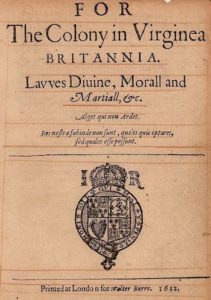
*On this date in 1607, the Virginia Company of London settled on Jamestown Island as the place to build their fort in America. Also called the London Company, it was an English joint-stock company. It was established in 1606 by a royal charter from King James I to establish colonial settlements in North America. In Renaissance England, wealthy merchants were eager to find investment opportunities, so they established several companies to trade in various parts of the world; part of this included slave labor from investing in the Middle Passage.
Each company was made up of investors, known as "adventurers," who purchased shares of company stock. The Crown granted a charter to each company with a monopoly to explore, settle, or trade with a particular region. The investors shared profits according to the amount of stock each owned. More than 6,300 Englishmen invested in joint-stock companies between 1585 and 1630, trading in Russia, Turkey, Africa, the East Indies, the Mediterranean, and North America. The territory granted to the London Company included the eastern coast of America from the 34th parallel (Cape Fear) north to the 41st parallel (in Long Island Sound).
The London Company owned a large portion of Atlantic and Inland Canada as part of the Virginia Company and Colony. Its charter permitted the company to establish a 100-square-mile (260 km2) settlement within this area. The portion of the company's territory north of the 38th parallel was shared with the Plymouth Company, stipulating that neither company found a colony within 100 miles (161 km) of the other. The London Company made landfall on April 26, 1607, at the southern edge of the mouth of the Chesapeake Bay, which they named Cape Henry, near present-day Virginia Beach. Deciding to move the encampment, on May 4, 1607, they established the Jamestown Settlement on the James River about 40 miles (64 km) upstream from its mouth at the Chesapeake Bay.
Later, in 1607, the Plymouth Company established its Popham Colony in present-day Maine, but it was abandoned after about a year. By 1609, the Plymouth Company had dissolved. As a result, the charter for the London Company was adjusted with a new grant that extended from "sea to sea" of the previously shared area between the 38th and the 40th parallels. It was amended in 1612 to include the new territory of the Somers Isles (or Bermuda). The London Company struggled financially, especially with labor shortages in its Virginia colony. Its profits improved after sweeter strains of tobacco than the native variety were cultivated and successfully exported from Virginia as a cash crop beginning in 1612.
By 1619, a system of indentured service, which evolved into chattel slavery, was fully developed in the colony; the same year, the home government passed a law that prohibited the commercial growing of tobacco in England. In 1624, the company lost its charter, and Virginia became a royal colony. A spin-off, The London Company of The Somers Isles (fully the Company of the City of London for the Plantation of The Somers Isles, but generally referred to as The Somers Isles Company), operated until 1684.